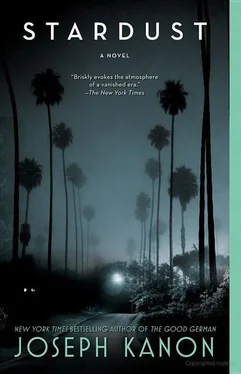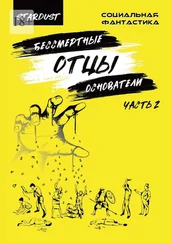Joseph Kanon - Stardust
Здесь есть возможность читать онлайн «Joseph Kanon - Stardust» весь текст электронной книги совершенно бесплатно (целиком полную версию без сокращений). В некоторых случаях можно слушать аудио, скачать через торрент в формате fb2 и присутствует краткое содержание. Жанр: Триллер, на английском языке. Описание произведения, (предисловие) а так же отзывы посетителей доступны на портале библиотеки ЛибКат.
- Название:Stardust
- Автор:
- Жанр:
- Год:неизвестен
- ISBN:нет данных
- Рейтинг книги:4 / 5. Голосов: 1
-
Избранное:Добавить в избранное
- Отзывы:
-
Ваша оценка:
- 80
- 1
- 2
- 3
- 4
- 5
Stardust: краткое содержание, описание и аннотация
Предлагаем к чтению аннотацию, описание, краткое содержание или предисловие (зависит от того, что написал сам автор книги «Stardust»). Если вы не нашли необходимую информацию о книге — напишите в комментариях, мы постараемся отыскать её.
Stardust — читать онлайн бесплатно полную книгу (весь текст) целиком
Ниже представлен текст книги, разбитый по страницам. Система сохранения места последней прочитанной страницы, позволяет с удобством читать онлайн бесплатно книгу «Stardust», без необходимости каждый раз заново искать на чём Вы остановились. Поставьте закладку, и сможете в любой момент перейти на страницу, на которой закончили чтение.
Интервал:
Закладка:
“You mean camp there?”
“No, we have places to stay. Dormitories for the staff. A few rooms for guests. It used to be very popular, with the other stars,” he said, smiling. “Hubble liked to take them up. Fairbanks, Pickford, all of them. You can see the pictures. So if you like, I’ll arrange it. A family excursion. But now-” He looked around, ready to go. “A sad occasion. It’s a pity you did not get a chance-”
“No, only at the hospital. For a minute.”
“He spoke?”
Ben shook his head, not wanting to go back.
“No last words. I’m sorry,” Dieter said, taking Ben’s hand. “So we’ll make a trip. Hans,” he said, now reaching for Ostermann’s hand, “be well. You should listen to her, you know. That woman. No petitions. No letters in the paper. It draws attention to all of us.”
Ostermann watched him leave, a politer version of Alma’s exit, then sighed and busied himself relighting his cigar.
“More American than the Americans. Except for the accent. He thinks no one hears it.” He nodded toward the city below, spread across the flat basin. “Look at that. You know, every building you see, it’s the first. There was nothing on this land before. Imagine. In Europe we live on layers. Here it’s only the first. So what will it become? It’s interesting. But do any of us care? We don’t really live here. I’m still in Berlin. My study even, it’s like before. Writing 1919. You like the title? Just the year. No one here will be interested, it’s for me. What happened to us. Mann’s writing Bible stories. Bible stories after all this. The conscience of his country.”
“I thought that was you.”
He smiled a little. “The bad conscience maybe. I’m sorry. Such gloomy talk. Your brother used to call it the exile mentality. Always half-empty. But it was different for him. He never had to worry about leaving. Being asked to leave. He was born here. Sometimes I think we got out with our skins but our lives-they’re somewhere in-between. Still waiting for the knock.”
“Not here.”
“We’re still watched.” He caught Ben’s skeptical look and nodded. “We’re German, we have a sixth sense for this now. The phone I think sometimes, the mail I know.”
“Really?”
“There’s a group, more exiles, in Mexico-it was easier to get a visa there. So they write to me sometimes and I think the letters are being read. You know, opened and resealed. So, a test. I tell them to write in English and you know what? The letters arrive three days earlier-the censor doesn’t have to translate. So I know.”
“But why? Did they think you were a Nazi? You?”
Ostermann smiled weakly. “Anybody foreign. There’s no logic to this. It’s like Polly. You start turning over rocks, you have to find something, or why did you start? So you keep doing it. I’m used to it. In Germany it was the same-well, worse. But you have to be careful. You say things and it might go against you with Immigration. It’s better since the war, but Brecht says they’re still watching him. Even now.” He shook his head. “Such a dangerous person. In Santa Monica.” He moved away from the potted geraniums, taking a chair and leaning back in it, his eyes still on the view. “It’s an irony, yes? What we came to escape. Like poor Connie Veidt, playing Nazis. They wanted to kill him there, and then here it was all he can do, be a Nazi. It was the voice. Like Liesl.”
“Like Liesl?” Ben said, confused.
“The accent. You know she was an actress. Small theaters only, but good, I think. Of course the father says that. But Salka says she had talent. And then we left and she lost her voice.”
“Couldn’t Danny get her work?”
“Here? Even Lorre, an actor like that, couldn’t play American.” He smiled. “Mr. Moto. A Japanese. A girl with a German accent? Not so many parts for her. And you know, I think Daniel liked her at home. So she gave it up. Became the Hausfrau.”
“And your translator.”
“Yes,” Ostermann said, looking up. “A help to me, too, I admit. And now? It’s a worry. When someone dies this way, you think, I never knew him. You turn it over and over in your mind, trying to make sense of it.”
“Yes,” Ben said, an almost involuntary response.
“Everything becomes a lie. Your own life. I don’t want that for her.”
“But everything wasn’t.”
“No, not everything. But which?” He drew on the cigar. “How little we know about each other,” he said, brooding. “Even when we think we know.”
GOWER GULCH
At the police station he was directed to a basement room that resembled a post office will-call window, with rows of files behind.
“Accident report? Kohler?”
“You’re with the insurance?”
“His brother.”
“Companies usually get it direct. Not through the family.”
“But I could see it?”
“You could ask,” the clerk said, then got tired of himself and went to get the folder.
In fact, there was little Ben didn’t already know. A more precise time. No eyewitnesses to the fall itself. Neighbors alerted by the sounds of garbage cans knocked over when the body hit, an unexpected detail. No scream. At least none reported. Police response time. Alcohol in the room (dizzy spells not even necessary here-already unsteady). Taken to Hollywood Presbyterian with head injuries and multiple lacerations. Several boxes with numbers and acronyms for internal use. Everything consistent.
“I was told there were pictures.”
“Told how?”
“They took pictures.”
The clerk stared at him, annoyed, then checked the report again, glancing at one of the numbered boxes.
“Give me a minute,” he said, going back to the file room, a martyr’s walk.
He returned opening a manila envelope. “We don’t usually show these to family.”
“What do I need? A court order?”
The clerk passed them over. “Just a good stomach.”
Danny in the hospital had been hard to look at, but still a patient, sanitized, wrapped in bandages, the lacerations stitched closed. Here his face was torn open and the gashes poured blood, his head lying in a pool of it. Ben flipped through the pictures-the body from several angles, limp, legs twisted, a shot of the balcony (for a trajectory?), the alley crowded with onlookers and ambulance workers. Crime scene photographs.
“Why weren’t these in the file?”
“You’re lucky they’re here at all. Should’ve been tossed. No reason to keep them in an accident file.”
“Can I have them?”
“Police property.”
“Which you were going to toss.”
“Still police property. What do you want them for?” Genuinely puzzled, looking at Ben more carefully now. A morbid souvenir.
“How about some paper then? I need to take some notes. For the insurance.”
The clerk reached below and brought up some paper.
“Next time bring your own. That’s taxpayer money.”
“I’m a taxpayer.”
“Don’t start.” He went over to his desk and lit a cigarette.
Ben held up one photo, then jotted down a note, waiting for the clerk to get bored and turn away. The one thing you learned in the Army: The answer was always no, unless you could get away with it. All bureaucracies were alike. The clerk, still smoking, looked up at the clock. Ben drew out the rest of the photos, negatives clipped to the last. He copied another note, then began feeding paper into the envelope. When the clerk answered the phone, he slid the pictures under his newspaper, added some more paper to the envelope and closed it, pushing it back along the counter.
“Thanks for your help,” he said, turning away with the newspaper.
The cop waved back.
The day clerk at the Cherokee could have been the policeman’s cousin, the same wary indifference.
Читать дальшеИнтервал:
Закладка:
Похожие книги на «Stardust»
Представляем Вашему вниманию похожие книги на «Stardust» списком для выбора. Мы отобрали схожую по названию и смыслу литературу в надежде предоставить читателям больше вариантов отыскать новые, интересные, ещё непрочитанные произведения.
Обсуждение, отзывы о книге «Stardust» и просто собственные мнения читателей. Оставьте ваши комментарии, напишите, что Вы думаете о произведении, его смысле или главных героях. Укажите что конкретно понравилось, а что нет, и почему Вы так считаете.












